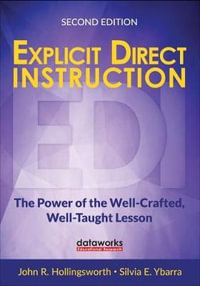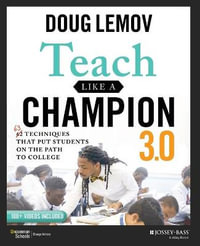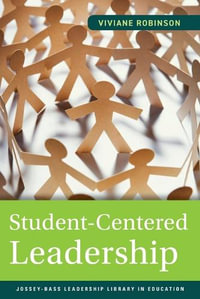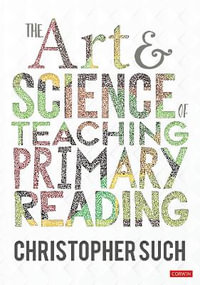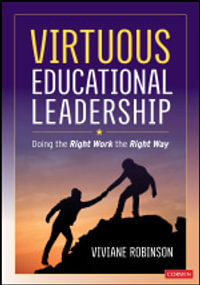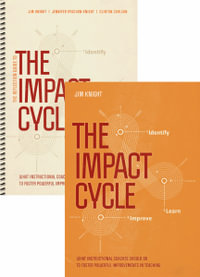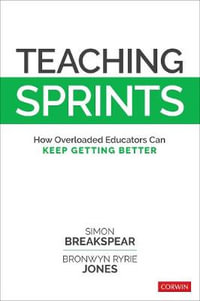Successful learning is as much about emotion as it is about cognition
Discover how to manage the emotional dynamics of learning success and build strong relationships in order to realize profound achievement gains. Bestselling author Rick Stiggins shares important lessons learned from his career-most importantly, how to help students become confident, lifelong learners.
Separate chapters for teachers, parents, and school leaders discuss how to form teams to explore home and school partnerships, the keys to effective learning, a growth mindset, the Visible Learning (R) research, and assessment FOR learning. Rick shows us how to ensure students
- Understand the learning targets
- Are able to monitor their own progress
- Can act assertively to close the gap between where they are now and where they need to be
Call it self-efficacy, student agency, or internal locus of control-the label doesn't matter. What does matter is that every student discovers that they can meet whatever challenges our rapidly changing society presents.
Industry Reviews
"Rick Stiggins has done an amazing job capturing in plain language what so many organizations, think tanks, school districts, and others have been struggling to articulate. That is, the importance of cultivating student self-efficacy through transparency, ongoing feedback, and quality assessment methods. We have spent the past 20 years testing students as if they owe us data that proves they're proficiency and growth. This book upends that and reminds us that (for educators' purposes at least) we can and should be developing and implementing high quality assessments suited to inform and drive student learning. Rick's message is amplified by the fact that it's grounded in his decades of experience as a psychometrician. He does a masterful job articulating what many practitioners and school leaders have long been saying - we have to stop treating the process of assessment like a "gotcha" and create systems that value transparency and fuel student motivation and confidence. With appropriate standards and guidelines, we can create processes ALONGSIDE our students (and even families and communities) to assess and drive student learning. So many persons and entities lately have been trying to weigh in on what should happen NEXT now that we realized that test-driven reform doesn't work. I think Rick's book outlines some clear steps toward an answer that will truly serve the best interests for students and schools. His voice is absolutely critical in this debate and at this moment because of his depth of knowledge and skills. It doesn't hurt that the book includes some heartwarming stories that I think will speak to readers, as well! Finally, I would add that speaking on behalf of myself, having Rick come out and say that the biggest issue with our assessment systems is not that we need MORE rote testing, or MORE data, or more commercial assessment products to fuel student achievement - but that we need MORE collaboration, transparency, and love - is so powerful. It means more coming from him because of his dedication to the field and his in-depth knowledge of responsible, safe, and high-quality assessment practices." -- Chris DonFrancesco "With a career that has consistently challenged our traditional thinking about assessment, Rick Stiggins lays out a compelling vision for assessment with students at the center of the action. The core of the is assessment FOR learning, where the student monitors and manages their own understanding and growth, not the just the teacher. This student-centered, holistic approach to assessment positions the teacher as a partner on the student's learning journey towards self-awareness and self-actualization. This book is an amazing read, especially in the way it speaks directly to students, teachers, school leaders, families, the community, and policy-makers. Stiggins also humanizes assessment by digging into emotions, confidence, and relationships...and by telling his own learning story! In doing so, he makes us all think about our own journey and how we have been impacted, in both good and bad ways, by curriculum, instruction, and assessment." -- Timothy Dohrer "Last year Dr. Stiggins conducted a professional development seminar at the district. I attended that session and later received a draft of his upcoming book "Give Students the Gift Of Confidence: A Silver Lining Playbook for Teacher/Parent Teams". I was very impressed by Dr. Stiggins' presentation and book. I was surprised to discover that his manuscript perfectly described the same assessment for teaching and learning strategy used by the US Army since 1980 to evaluate within individual and unit training. I am a retired Army officer, with 30 years of experience training and leading US Army combat units. As a commander, operations and training officer, and director of a major US Army school, I know that Dr. Stiggins' assessment strategy works. His book describes assessment based on research in a manner that is understandable and compelling to the board members so we can allocate resources for training for administrators and faculty with little prior understanding of complex assessment practices. In short, this book should be provided to every school board member interested a coherent strategy to improve student academic performance." -- Richard P. Geier "This playbook is a must-have for parents, teachers, intervention teams, school leaders, and educational policy makers to align and create the definition of and path to success for our children and students. Rick poignantly weaves real life experiences and years of research into simple logical tools for teachers, parents, and intervention teams to empower the student to be successful, confidant, resilient, self-reliant, and approach learning with joy and enthusiasm. The simple tools for success are clearly outlined giving parents, teachers, students, and intervention teams an approach to learning by supporting our students though clear goals, transparency, and guidance in the path to reach those goals, as well as ample successes along the way leading to confidence resulting in the student's ability to be responsible, passionate, resilient, and successful lifelong learners. It's a must-read for every educator and parent simplifying how we can align to truly give our children the gift of confidence." -- Kim Harley "The results of large-scale educational assessments are typically quantified and presented as 'data' while classroom assessments lead to letter grades. While seemingly objective, these impersonal numbers and letters can obscure the underlying emotional impacts they have on learners. In his latest book, international assessment authority Rick Stiggins turns the dial to explore the psychological effects of many traditional testing practices and explores alternative classroom assessment approaches that teachers can employ to increase student achievement and boost the academic confidence of the students we serve. This important book is recommended to teachers, administrators, policy makers and parents." -- Jay McTighe "It is a rare book that is simultaneously inspirational and practical. Give Our Students the Gift of Confidence meets that challenge in a profound and personal way. Rick Stiggins brings us back to the essence of student learning-authentic engagement of students in their own learning. He reminds us that students neither succeed through authoritarian demands, threats, and intimidation nor with false assurances that failure is fine as long as students feel good about themselves. Rather, he encourages educators and parents to challenge the students we serve, confident that students are supremely capable of school success if only we give them the support, encouragement, empowerment, and love that each deserves. Finally, Stiggins balances rigorous research with personal reflections that are deeply moving. If you don't shed a tear for Little Rick, then you won't cry at the end of Charlotte's Web. This book will make you think, reflect, and, most importantly, act." -- Douglas Reeves "There is no greater way to achieve a sense of confidence than understanding one's scenario or situation. For students, confidence comes from understanding what you are required to know and be able to do to master the standards being taught. Formative assessments FOR learning, as Rick defines them, can give them that understanding. This puts a student in control of their learning. I have been a teacher, school administrator, district director of transformation schools, assistant superintendent, regional superintendent and now as a current sitting Superintendent trying to accelerate student learning after the COVID pandemic and its impact on students. What I find profoundly most impactful in Rick's manuscript is the power that my faculty and I can derive from making sure that we build student confidence by making sure that they understand the end goal of their instruction, where they are now in relation to those expectations, how they can close the gap between those two keys to their success. If students have a clear understanding of these, it will reduce their anxiety and that is key to building confidence. As Rick so aptly puts it, "successful learning in any context is as much about emotion as it is about cognition and good teaching is as much about managing student emotions as it is about managing instructional strategies". Putting students in control of their learning via ongoing student-involved formative assessment is a strategy that promotes learning success and build confidence. For example, his idea of providing them with the ability and opportunity to show their parents how much they know and can do as they lead parent conferences builds confidence and puts them in command of their learning." -- Frank Rodriguez "Throughout my life, I had always considered the process of learning to be a natural and desired process that was similar for everyone and I've thoughts that one's achievement was simply the result of effort and intelligence. It was the diagnosis of dyslexia in two grandsons that spurred my interest in HOW each of us learns and the challenges so many students must overcome in their quest for knowledge. I was, therefore, thrilled when Rick sought my comments on this manuscript. Based on his own personal experience, Rick describes how the often overlooked dynamic of the emotional health of the student affected his confidence, ability to learn, and overall self-esteem. This was especially relevant to me since my own grandson broke down in tears when extensive testing revealed he had severe dyslexia and was otherwise highly intelligent. He tearfully admitted that he had always considered himself to be "stupid." Knowing that his intelligence was normal and after receiving the tools and support to overcome his dyslexia, his anxiety went away, his sleep improved, his self-esteem skyrocketed, and he became much more comfortable and successful in school. This book is crucial reading for all teachers and administrators, but it is especially important for those involved in serving students with special needs. Rick describes how the self-inflicted hopelessness of a struggling learner can affect not only their academic future, but also their perception of their place in society. He speaks for teachers and parents who want educational leaders to supply them with the tools they need to prevent a potentially devastating loss of self-esteem and to build in students the desire to pursue the knowledge they will need to succeed in life. This is a critically important book that will motivate and guide parents, teachers, and PTA leaders to join with their students to advocate that local, state, and federal educational policy makers supply teachers with strategies to recognize learning disorders and teaching methods to help every student reach their targets with confidence, self-esteem, and pride." -- Roger Wickland




